Related Research Articles
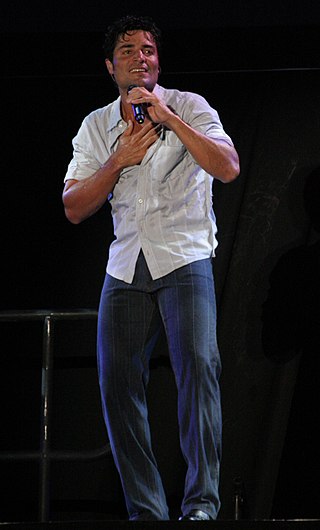
Elmer Figueroa Arce, better known under the stage name Chayanne, is a Puerto Rican Latin pop singer and actor. As a solo artist, Chayanne has released 21 albums and sold over 15 million records worldwide, making him one of the best-selling Latin music artists.

Rubén Blades Bellido de Luna, known professionally as Rubén Blades, is a Panamanian musician, singer, composer, actor, activist, and politician, performing musically most often in the salsa, and Latin jazz genres. As a songwriter, Blades brought the lyrical sophistication of Central American nueva canción and Cuban nueva trova as well as experimental tempos and politically inspired Son Cubano salsa to his music, creating "thinking persons' (salsa) dance music". Blades has written dozens of hit songs, including "Pedro Navaja" and "El Cantante". He has won twelve Grammy Awards out of 20 nominations and eleven Latin Grammy Awards.

La Oreja de Van Gogh is a Spanish pop band from Donostia-San Sebastián, Spain. The band's lyrics and compositions are written primarily by Xabi San Martín, and additionally by Pablo Benegas. The lyrical themes of their songs typically include love, friendship and relationships. Since their debut, they have sold more than 8 million albums worldwide.

Janette Anne Dimech, known professionally as Jeanette, is a Spanish English-born singer and songwriter. She first rose to prominence as the lead singer of Pic-Nic, a teenage folk-pop band that found success in 1968 with her song "Cállate, niña". Jeanette returned as a solo artist in 1971 with the Hispavox single "Soy rebelde", which redefined her career as a romantic balladist and was a hit across the Spanish-speaking world, becoming a generational anthem.
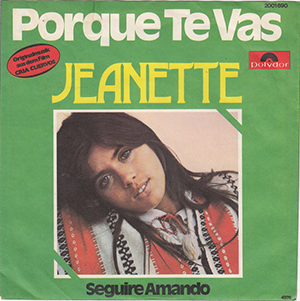
"Porque te vas" is a song by English-born Spanish singer Jeanette, written by José Luis Perales and produced by Rafael Trabucchelli for record label Hispavox in 1974.

Nena Daconte is a Spanish pop band created and led by singer and composer Mai Meneses in Barcelona circa 2005. The band takes its name inspired by a character from the short story "The Trail Of Your Blood On The Snow", by Gabriel García Márquez.
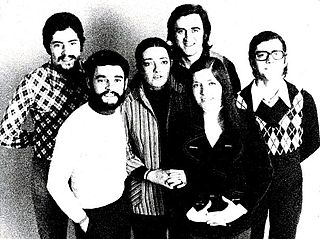
Mocedades is a Spanish singing group from the Basque Country, who represented Spain in the Eurovision Song Contest in 1973 with the hit song "Eres tú". Since June 2014, Mocedades has been the name of two bands: one with Izaskun Uranga as its leader and the other with Javier Garay. A third group, El Consorcio, is composed of former Mocedades members who left the group but have continued a career together outside the Mocedades brand.

"Tu te reconnaîtras", is a song recorded by French singer Anne-Marie David, with music composed by Claude Morgan and lyrics written by Vline Buggy. It represented Luxembourg in the Eurovision Song Contest 1973 held in Luxembourg, winning the contest.

Víctor Manuel San José Sánchez is a Spanish singer-songwriter. He has been married to the Spanish singer and actress Ana Belén since 1972. He and his wife are considered symbols of the Spanish Transition, and his songs and albums often feature boldly-titled works with social and political content.
"You Don't Have to Say You Love Me" is a 1966 song recorded by English singer Dusty Springfield, based on "Io che non vivo (senza te)" ("I, who can't live (without you)"), an Italian song with music by Pino Donaggio and lyrics by Vito Pallavicini, which was very successful in Italy.
"When a Child is Born" is a Christmas song, with a melody taken from "Soleado", a tune from 1974 by Ciro Dammicco. The tune was based on Dammicco's earlier tune "Le rose blu" published in 1972. The English lyrics were written by Austrian composer Fred Jay as a Christmas song. Versions of the song have been recorded by Michael Holm in 1974, Johnny Mathis, whose version was the 1976 Christmas number one in the UK, and Boney M, who included it on their hit 1981 Christmas Album.

"Love Theme from The Godfather" is an instrumental theme from the 1972 film The Godfather, composed by Nino Rota. The piece was lyricized in English by Larry Kusik into "Speak Softly, Love", a popular song released in 1972. The highest-charting rendition of either version was by vocalist Andy Williams, who took "Speak Softly Love" to number 34 on Billboard magazine's Hot 100 and number seven on its Easy Listening chart.

"This Guy's in Love with You" is a hit song written by Burt Bacharach and Hal David and released by Herb Alpert in May, 1968. Although known primarily for his trumpet playing as the leader of the Tijuana Brass, Alpert sang lead vocals on this solo recording, which was arranged by Bacharach. An earlier recording of the song by British singer Danny Williams with different lyrics titled "That Guy's in Love" appeared on Williams' 1968 self-titled album.
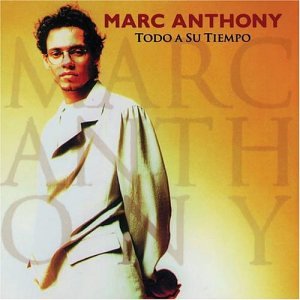
Todo a Su Tiempo is the second studio album by American recording artist Marc Anthony, released by RMM Records on May 31, 1995. The album was produced by Sergio George, who was also involved with production of Anthony's debut studio album, Otra Nota. The album comprises five new compositions, three of which were written by Omar Alfanno, and four cover versions. Eight singles were released from the album, all but one of which topped the Billboard Tropical Songs chart.
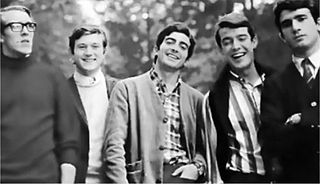
Los Sírex is a Spanish rock band founded in 1959 in Barcelona and active until 1972. In 1977 they got together again and were active until 2012. It was initially formed by three members: Guillermo Rodríguez Holgado, Antonio Miers and Manuel Madruga (Manolo), then briefly joined by the vocalist Santi Carulla in 1960. By the end of 1960, the band consisted of Antoni Miquel Cerveró as lead vocalist, Lluís Gomis on the drums, Josep Fontseré Portolés on the rhythm guitar, Guillermo Rodríguez Holgado on the bass and Manolo Madruga on the lead guitar. They named the band after a component of eyeglasses: Guillermo worked at his father's glasses factory, where they used a filament called Sírex to adjust the lenses to the frames of the glasses. They became identified with a pure rock and roll style with daring lyrics that caused them trouble with the Spanish censorship of the time. They sang in Spanish.
"Tornerò" is a song by the Italian musical group I Santo California, released in 1974 as their debut single. The following year, the down-tempo love ballad became a number-one hit in Italy as well as a top five hit in German speaking countries. In Italy, it spent 3 consecutive weeks at no. 1 in June and July 1975, and was certified gold. In Switzerland, it remained at the top for 6 consecutive weeks in September and October 1975, and was the best-selling single of the year there. The song has been covered by numerous artists in various languages.
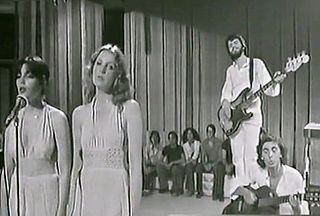
Daniel Sentacruz Ensemble was an Italian pop group formed in 1974. Their first single "Soleado", a semi-instrumental track written by lead singer Ciro Dammicco and Dario Baldan Bembo, sold over five million copies in Europe, giving the band international popularity. In 1976 and in 1978 Daniel Sentacruz Ensemble entered the Sanremo Music Festival with the songs "Linda Bella Linda" and "1/2 notte". Unable to replicate their initial success, the group eventually disbanded in 1980.

David Otero is a Spanish singer, guitarist and composer. He was a member of the pop rock band El Canto del Loco (1994–2010).

"Te Conozco Bien" is a song by American singer Marc Anthony from his second studio album, Todo a Su Tiempo (1995). The song was written by Omar Alfanno, with production being handled by Marc Anthony and Sergio George. It was released as the first promotional single from the album on May 30, 1995. A salsa song, it sees the singer express certainty that someone is regretful. The song was awarded the Billboard Latin Music Award in 1996 for "Hot Latin Track of the Year" in the Tropical/Salsa field and was nominated for the Tropical Song of the Year award at the 8th Annual Lo Nuestro Awards in the same year. It was a recipient of the ASCAP Latin Award in 1996. Commercially, the song peaked at number seven on the Hot Latin Songs chart and number one on the Tropical Airplay chart in the United States. It was the best-performing song of 1995 on the latter chart. The song was covered by Puerto Rican singer Ángel López as a ballad on his studio album Historias de Amor (2010).
Manuel Otero Aparicio, known as Manolo Otero, was a Spanish singer, actor and director.
References
- ↑ History of the Daniel Sentacruz Ensemble (in Italian language)
- ↑ "Manolo Otero - Todo el tiempo del mundo | Música callada - Blog elcorreo.com". blogs.elcorreo.com (in European Spanish). 23 June 2013. Retrieved 2017-04-05.
- ↑ "ST. ANDREWS CHORALE | full Official Chart History | Official Charts Company". Official Charts .
- ↑ Video on YouTube